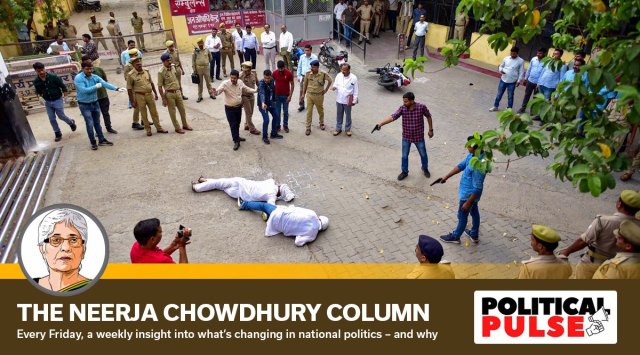The elimination of don Atiq’s empire: how Yogi has consolidated his politics of crackdown
Like the 2013 Muzaffarnagar riots polarised the state along Hindu-Muslim lines in the run-up to the 2014 LS polls, the Atiq-Ashraf killings threaten to do the same ahead of the big battle in 2024
 Special Investigation Team (SIT) and the forensic team recreate the crime scene, where three assailants shot dead gangster-turned-politician Atiq Ahmed and his brother Ashraf, in Prayagraj. (PTI)
Special Investigation Team (SIT) and the forensic team recreate the crime scene, where three assailants shot dead gangster-turned-politician Atiq Ahmed and his brother Ashraf, in Prayagraj. (PTI) The shocking Prayagraj killings are not just about the murder of dreaded gangsters Atiq Ahmed and his brother Ashraf at gun point, in the safety of police custody, in the presence of a posse of press persons who captured it on camera and ran the video over and over again on TV channels, taking those gruesome images into homes across the country. Worse, it showed the usually quick-to-react Uttar Pradesh policemen watching the drama helplessly. Not one pulled out a gun to stop the three who killed Atiq and his brother on the spot.
There are events in the life of a country which acquire a seminal character –and become harbingers of the future shape of things; this was one such moment.
The extraordinary intelligence and police failure should have put the Yogi Adityanath government on the mat. The killings represented an eye-for-an-eye and a tooth-for-a-tooth principle, a recipe for rough and ready justice — unthinkable in any civilised, let alone a democratic, nation. But it was happening in the India of 2023.
Voices from UP, in Gorakhpur, Lucknow, Muzaffarnagar, Noida, showed that a large number of people endorsed what had happened. “It has popular support of the Hindus — 150 per cent – that Atiq who created terror over the decades was finally gone,” remarked an entrepreneur in Lucknow. “Even the educated, professors, professionals, endorse what has happened,” said a Congress worker in Gorakhpur.
There are people in UP who say that while they wanted Atiq to be punished, they did not want it to happen this way. But, they also add, “Par jo hua, woh theek hua (But whatever happened, was right).”
A worker of the Aam Aadmi Party in Lucknow was upfront when he said, “I have been criticising the failure of the Adityanath government on behalf of my party, but I will tell you this very frankly — I too am happy (with what has happened).”
With witnesses fearful of deposing against dreaded criminals who have built vast empires, backed by political parties, and cases taking decades before they come to fruition, a mockery has been made of the system of criminal justice in India. Add to it the Hindu-Muslim conundrum, and unchecked crime, and you have the rise of the Yogi Adityanath phenomenon.
The Atiq-Ashraf killings give a glimpse into the politics of Yogi Adityanath, UP’s Chief Minister. “This incident has added several inches to Adityananth’s stature,” said an entrepreneur in Muzaffarnagar.
While Adityanath or the BJP may not have had anything to do with the killings, ordinary people give the UP CM the credit for “eliminating the mafia” — and believe that the BJP has the most to gain from it.
In what seemed an acknowledgment of the credit coming to him, two days after the killings, Adityanath said: “No mafia can threaten anyone in UP now.”
Having earned a reputation as the king of encounters and “bulldozer baba”, Adityanath has crafted his own loyal Hindu
constituency, with his actions against “love jihadists”, razing of properties of alleged criminals, his call on the floor of the Assembly that “Mafia ko mitti mein mila denge (reduce mafia to dust)” and crackdown on “illegal” madrasas.
Where Adityanath has taken the lead, other BJP states, like poll-going Madhya Pradesh, are following suit. In recent years, after Narendra Modi, it is Adityanath whom the BJP has put to use during election campaigns to polarise the situation and garner Hindu votes.
A senior BJP leader in the Union government had once said of the UP CM: “He has three unique selling points: he has controlled the law and order situation in UP, he has been able to bring in investments, and he has reined in the Muslims.”
Of course, the recent events will help Adityanath in the May 2023 elections to urban bodies in UP. But their impact will go beyond the local polls. Like the 2013 Muzaffarnagar riots had polarised the state along Hindu-Muslim lines in the run-up to the 2014 Lok Sabha elections, the Atiq-Ashraf killings threaten to divide the state along religious lines, ahead of the big battle in 2024.
Even before he first became the CM in 2017 (in a last-minute reversal of plans which, among other things, envisaged Manoj Sinha as the frontrunner), Adityanath had his independent following in UP as the head of the Gorakhnath Mutt in Gorakhpur, and owing to his Hindu Yuva Vahini, known as “Yogi ki sena”.
“Today, Adityanath has reached a point that he can win the election in UP without Modi’s help,” according to one political observer in Lucknow.
Narendra Modi has yet to unfold his action plan for 2024. But clearly, the PM cannot do without Adityanath — despite the UP CM’s effort from time to time to function autonomously of Delhi. The reason: UP is UP, and Adityanath is now firmly settled on the Lucknow gaddi.
Uttar Pradesh is critical for the BJP in 2024. It was UP which added 71 Lok Sabha seats to the BJP tally in 2014, without which it would not have touched the half-way mark. Again, it added 62 seats to the BJP’s total of 303 seats in 2019. The party is conscious that, as things stand, it may lose ground in Karnataka, Bihar, West Bengal, and Maharashtra — all large states — and it will have to pull out all the stops to retain its support base elsewhere. That is why all eyes continue to be on Maharashtra to see how the BJP can weaken the Opposition’s Maha Vikas Aghadi alliance.
Beyond the immediate politics, lie the larger questions which the Atiq episode has thrown up — and they will not go away so easily. They point to the institutional failure — legal, judicial, political, bureaucratic — to deliver justice and bring to book criminals who have cocked a snook at every institution and been used by political parties. It has generated a public reaction which is now looking for solutions outside the system. And this will only create new problems than resolve old ones. For the BJP, though, the way the state has responded to Umesh Pal’s murder has burnished Yogi Adityanath‘s credentials. That, in a year before Elections 2024, promises new wind in the party’s UP sails.
(Neerja Chowdhury, Contributing Editor, The Indian Express, has covered the last 10 Lok Sabha elections)
- 01
- 02
- 03
- 04
- 05































